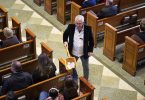
Medical Mission Sister Maigualida Riera and Juan Pablo Alvarez, 12, sing “gaita” with their band “Latidos” in Barquisimeto, Venezuela, Dec. 1. (CNS photo/Hildegard Willer)
by Hildegard Willer
BARQUISIMETO, Venezuela (CNS) — Carlos Etcheray made two wooden sticks dance over the drum as if he had done it all his life. The 13-year-old’s face broke into a grin as he played a gaita, the quick, cheerful rhythm that resounds throughout Venezuela’s streets during the Christmas season.
For the past two years, Carlos has been part of the musical program “Latidos,” Spanish for “Beats.” Six members of the group were playing at a Christmas party at a school beside a playground in Barquisimeto. They played and sang salsa, merengue, gaita and other South American rhythms so joyfully contagious that some of their listeners started dancing.
The most enthusiastic singer was a woman of about 50 with gray curls: Medical Mission Sister Maigualida Riera, founder of the “Latidos” program at Jesus of Nazareth Parish in Barquisimeto, Venezuela’s fourth-largest city. Her neighborhood, La Carrucienha, is one of the most violent in Barquisimeto. Theft, assaults and even murders are part of life in La Carrucienha. Sister Maigualida thought music could get kids off the street and show them a different path.
The program began with just a few instruments and the support of some music teachers in the community, but it grew quickly.
“Now there are nearly 80 people, including children, teens and teachers,” said Sister Maigualida, who notes, “music has always been a cornerstone of life.”
Carlos remembers the day two years ago when he knew he wanted to be a drummer.
“I came home from school and followed the kids who were going to the parish. I saw they were playing music,” he said.
Ever since, Carlos has gotten up early on Saturdays so he can be at the church at 8 a.m. for percussion classes and to rehearse with “Latidos.” Music, he said, has helped him deal with the harsh reality he has faced in his short life. Four years ago, his father was murdered — stabbed six times — as he returned home from work.
Juan Pablo Alvarez, 12, is the group’s soloist. Besides singing, he also plays the keyboard, and he is so enthusiastic that he says he would “like to play music all the time.”
Music has always been important in Venezuelan culture. Many people play the cuatro, a four-stringed guitar, or participate in the music groups that spring up during the Christmas season in neighborhoods, schools and universities. For decades, the government invested in a public music education system of youth orchestras that gained world renown. During the current economic crisis, with runaway inflation, that system has crumbled.
“They no longer pay the teachers,” said Sujey Caldera, a music teacher and current president of the Latidos Foundation. For “Latidos,” that has been a blessing, she added. “In our program, we have many well-trained teachers who have come from that system.”
As Christmas approaches, people face not only daily violence, but also hunger. The minimum monthly wage does not stretch to cover food for a week. Prices rise daily, and parents skip meals so they can feed their children. The Medical Mission Sisters’ soup kitchen provides 150 lunches a day, but that aid is only a drop in the sea of needs.
Just as gaitas fill the air during Christmas in Venezuela, hallacas are traditionally found on every table. Hallacas are a corn pastry filled with a stew of meat, raisins, eggs and olives and wrapped in banana leaves. Families traditionally prepare large quantities to give to relatives and friends.
“I’m afraid that this Christmas, there won’t be hallacas on every table,” Sister Maigualida said. Nor will there be gifts or new clothes, as usual on Christmas. “Many families will have to choose between food or new shoes — there’s not enough in their pockets for both.”
In times of crisis and great stress, listening to or playing music brings renewal.
Sister Maigualida said “200 or 300 people come to our concerts, and afterward they tell us, ‘We came without having eaten, but now we’re going away content.'”
“Music is part of our culture,” she said. “It’s a way of saying, ‘No, we’re going to keep going — a God of joy goes before us.’ That’s why we started the Latidos program.”
The youngest member of the group, 6-year-old Jesus Ignacio, plays the guiro and the guitar. He describes the meaning of those beats from which Latidos takes its name: “They are the beats of the heart and of friendship.”






